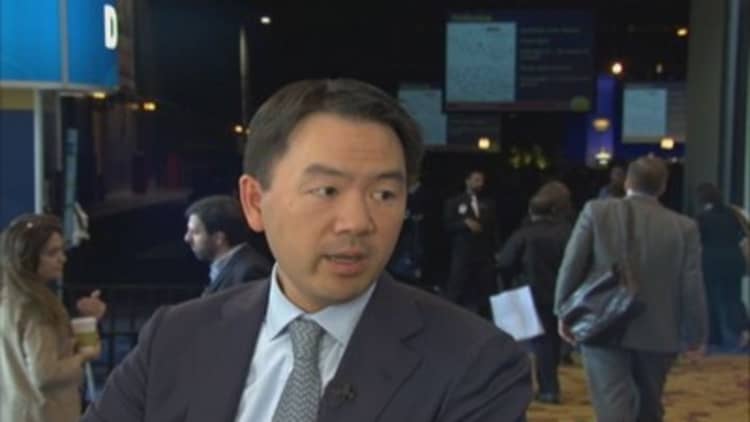
Shares of Clovis Oncology, Ariad Pharmaceuticals and Pharmacyclics are on the move Monday as investors begin to digest news coming out of closely watched annual American Society of Clinical Oncology (ASCO) meeting, the year's biggest cancer research meeting.
Over the weekend thousands of oncologists, investors, researchers and analysts descended on Chicago and here are some of the biggest takeaways from discussions over the weekend.
AstraZeneca and Clovis Oncology in lung cancer
Both companies presented data on their lung cancer drugs, AZN9291 and CO1686, respectively.
In AstraZeneca's trial, 64 percent of patients with an important mutation known as T790M saw their tumors shrink, while in Clovis', 58 percent did. T790M is linked to resistance to existing treatments for this kind of lung cancer, leading patients' disease to progress on other therapies.
Read MoreWhere we stand in the fight against cancer
The data are still young, but shares of Clovis were down about 8 percent in early trading Monday. (Click here for the latest Clovis quote.) The trials are in the early phases of what is generally required for regulatory approval. Analysts say the competition may come down to the side effect profiles of each medicine.
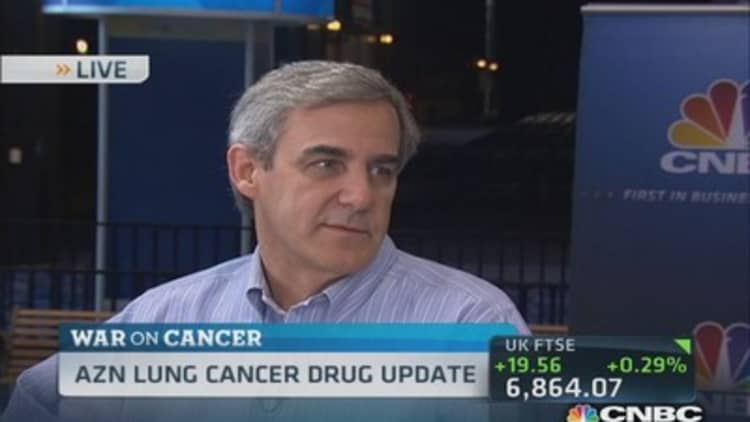
AstraZeneca's drug was related to "interstitial lung disease-like" side effects in some patients (interstitial lung disease, or ILD, can cause progressive scarring of the lung tissue, according to the Mayo Clinic, and is often associated with exposure to hazardous materials, like asbestos—however, note the "ILD-like" terminology), while Clovis's was associated with hyperglycemia, or high blood sugar, in some patients. Analysts noted the side effects with AstraZeneca's drug may be manageable at the right dose, while Clovis said hyperglycemia can be managed with a commonly prescribed medicine.
Read MoreWhat GSK cancer deal shows about pharma
AstraZeneca's drug was a key part of its defense against Pfizer's $120 billion takeover bid; the British drugmaker estimates AZN9291 will draw $3 billion in peak annual revenue. Both its drug and Clovis's have received Breakthrough Therapy Designation from the U.S. Food and Drug Administration, a status designed to accelerate important medicines to market.
Pharmacyclics
Shares of the Sunnyvale, California-based company were trading higher Monday after its approved leukemia drug Imbruvica was shown to help patients live longer than GlaxoSmithKline's Arzerra in a clinical trial published online in the New England Journal of Medicine. The study, called RESONATE, showed Imbruvica reduced patients' risk of death by 57 percent compared with Arzerra.
Ian Somaiya, an analyst with Nomura Securities, said he found the detailed data "even stronger than initial impressions," and recommended buying Pharmacyclics stock ahead of a formal presentation of the data on Tuesday. (To get the latest Pharmacyclics quote, click here.)
Analysts and investors have been watching a potential competitor drug from AbbVie, called ABT-199, very closely. J.P. Morgan analyst Cory Kasimov noted the medicine, while appearing very effective, may have side effects that limit how long patients will take it, and said doctors may opt to use it after patients have tried other therapies including Imbruvica or Gilead's idelalisib, or potentially in combination with them.
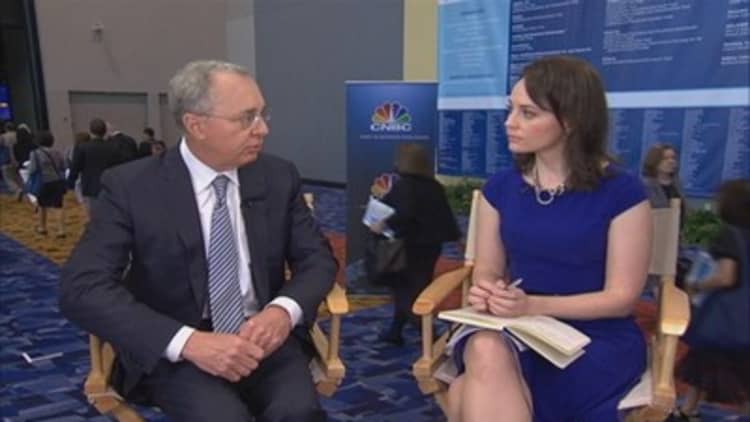
Ariad Pharmaceuticals
The Cambridge, Massachusetts-based biotech company reported data on Iclusig, its only approved medicine that was pulled from the U.S. market temporarily last year over safety concerns. It was approved to return to shelves in December with a narrower indicated patient population and more safety oversight requirements.
Read MoreImmuno-what? How these cancer therapies work
Ariad showed some early data from a trial called EPIC that was stopped partway through, comparing Iclusig with Novartis's Gleevec as a first treatment option in chronic myeloid leukemia.
When the drug was pulled from the market, analysts and investors questioned whether it would ever become a first-line treatment option. J.P. Morgan's Kasimov said in a research note over the weekend that he believes the drug "may have a place in earlier lines of therapy, but think[s] there is a lot of work to be done before docs become comfortable using the drug in that setting."
Ariad shares were up about 8 percent in early trading Monday. (For the latest Ariad stock quote, click here.)
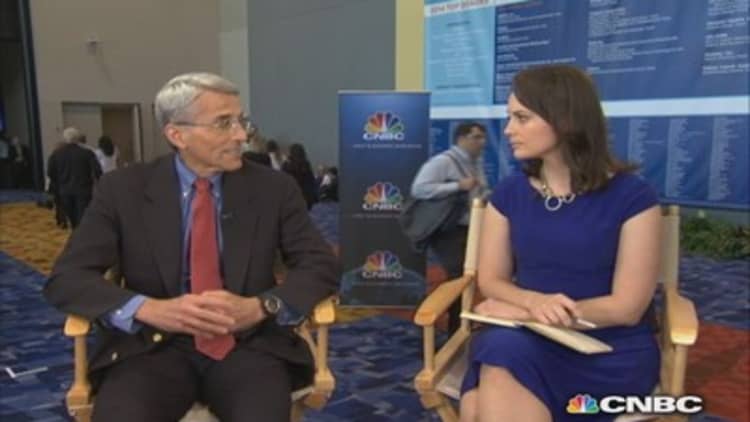
AstraZeneca in ovarian cancer
In what Leerink's Fernandez called "the biggest upside surprise among all the data presented at ASCO," two experimental AstraZeneca drugs were shown to help patients with ovarian cancer live longer without their disease progressing than one of the drugs alone. The data suggest the combination "has the potential to replace chemotherapy in patients with ovarian cancer," Fernandez wrote.
Read MoreASCO Meeting: This year it's pharma's show
AstraZeneca has pegged potential sales of one of the drugs, olaparib, at about $2 billion.
Immunotherapies: Bristol-Myers, Roche and Merck
The hottest topic at the conference so far is immunotherapy—empowering the immune system against cancer. Bristol-Myers reported some data on its experimental drug nivolumab in kidney cancer that Fernandez called "muted despite impressive survival," noting data on a combination of that medicine with an approved one, Yervoy, have yet to be presented. Those are expected Monday.
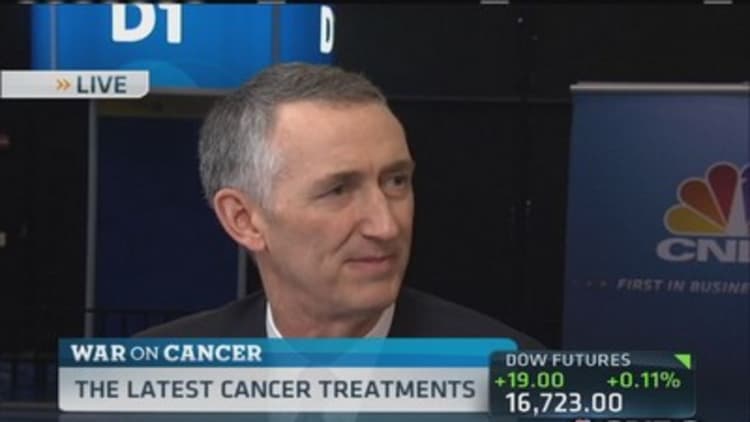
Roche announced it received Breakthrough Therapy Designation from the Food and Drug Administration (FDA) for its experimental immunotherapy, MPDL3280A, in bladder cancer, a disease Roche says hasn't seen a new treatment advance for almost 30 years.
Merck reported data on its experimental immunotherapy, MK3475, in head and neck cancer that ISI Group analyst Mark Schoenebaum called "encouraging," though noted the data were from early studies.
Foundation medicine
Foundation Medicine makes tests to identify the drivers of cancer to help doctors choose the right drugs for each patient. In a study presented over the weekend, Foundation reported that its FoundationOne test prompted physicians to switch their recommendation for therapy in 27 percent of cases.
Read MoreCramer's alternative medicine for biotech blues
The next step, Chief Executive Officer Mike Pellini said in an interview Sunday, is to show the implications of having such an impact on physicians' decision-making—that making changes based on the knowledge gleaned from the FoundationOne test actually improves patients' outcomes.
Still to come
There are still two days of ASCO to go. Stay tuned for more immunotherapy data from Bristol-Myers, Merck and AstraZeneca, plus updates from Incyte and others. And check out our live interviews with many of these companies throughout the day Monday on CNBC.
—By CNBC's Meg Tirrell

